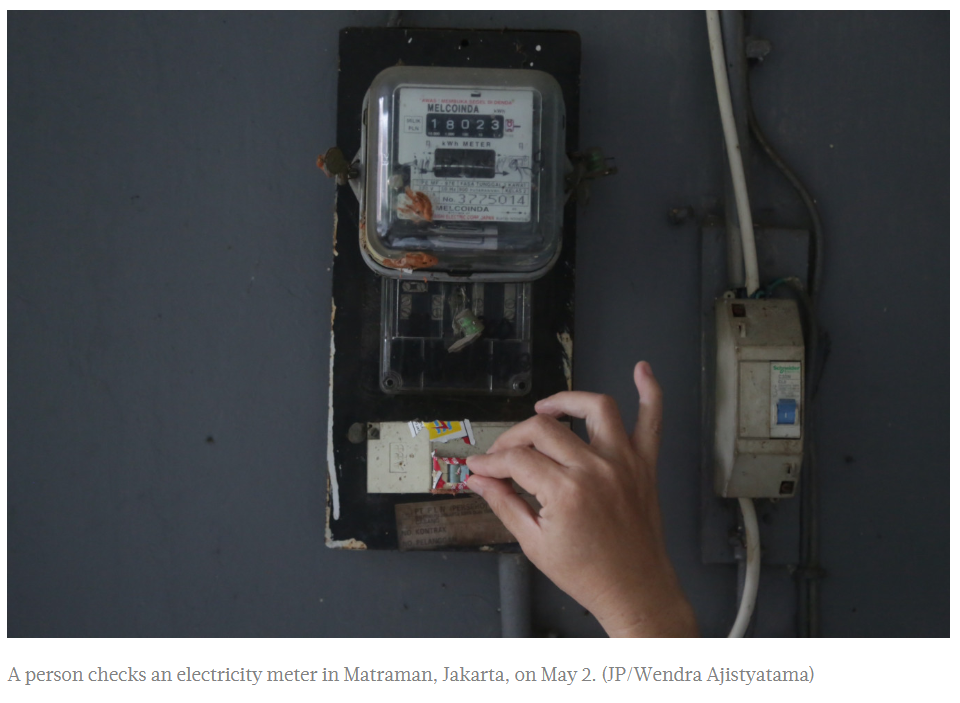Indonesia: PLN admits new calculation method causes increase in electricity bills
State-owned electricity company PLN acknowledged that the use of a new calculation method had caused an increase in electricity bills in April.
PLN Jakarta general manager Ikhsan Asaad said on Wednesday that his office had addressed 2,200 complaints related to high electricity bills within the capital for the previous month.
Ninety-four percent of the increases were proportional to an increase in electricity consumption, which mostly rose because many people had started working from home, while the other 4 percent may be due to flaws in the new calculation method, he said
“Six percent needs correction as we used the three month average method,” he told The Jakarta Post on Wednesday, adding that these 132 customers were eligible for compensation in next month’s bill.
PLN’s new billing method calculates monthly residential power bills based on consumption in the previous three months. The higher-than-usual consumption in March is, for example, billed in April.
“This shocked consumers,” Indonesian Consumers Foundation (YLKI) chairman Tulus Abadi told the Post. “PLN’s communication with consumers during the pandemic has been lacking.”
PLN said in March that it would introduce the new method in April to minimize physical contact between consumers and company inspectors to contain the COVID-19 outbreak in one of Southeast Asia’s hardest-hit countries. Under the new method, customers are requested to send the data of their electricity meters through WhatsApp to PLN.
But Tulus said PLN’s efforts were insufficient as some customers were unaware that staying at home would likely increase power bills.
“If bills spike, let’s say 75-100 percent, then consumers should immediately report it to PLN for clarification,” he said.
Shocked consumers took to Twitter and Instagram in early May to talk about their April electricity bills. Some netizens wrote that their bills were between 50 and 100 percent higher than usual. Some complained about being billed despite not being at home. Others said their bills were unchanged or even lower than usual.
Twitter user @Faizasenja, for example, wrote the electricity bill for her home in Yogyakarta for April “went up almost twice the usual amount” even though she was in another province that month.
PLN corporate communications head I Made Suprateka, also on Wednesday, said many houses were billed full amounts for April, despite being unoccupied, due to the new billing method. The company is supposed to only charge 40 hours’ worth of electricity per month for each registered home when unoccupied, based on government regulations.
According to PLN data, household power consumption in Jakarta rose 6 percent year-on-year in April, when the city implemented a partial lockdown, officially called a large-scale social restriction (PSBB).
However, the city’s overall power consumption fell 20 percent as declines in business and shopping mall power consumption exceeded the increase in residences.
Other netizens speculated that PLN had secretly raised electricity rates last month to compensate for losses from giving free or discounted electricity to the country’s poorest households, at the behest of the government.
“There are those assuming PLN is cross-subsidizing. That assumption is groundless,” said Made, adding that rates were unchanged since 2017 due to government regulations.
Indonesian Ombudsman member Laode Ida, in a statement issued on May 4, said his side had also received many complaints regarding rising household electricity bills.
He urged PLN to resume sending inspectors to individual households to manually read electricity meters instead of having consumers self-report the meters.
PLN’s Ikhsan assured the company would still deploy inspectors in Jakarta in May to train homeowners on how to self-report electricity consumption.
“We will see, going forward. If many customers do not want or do not have the time to self-report electricity meters, we may extend the service,” he said.
Source: https://www.thejakartapost.com/news/2020/05/08/pln-admits-new-calculation-method-causes-increase-in-electricity-bills.html


 English
English




